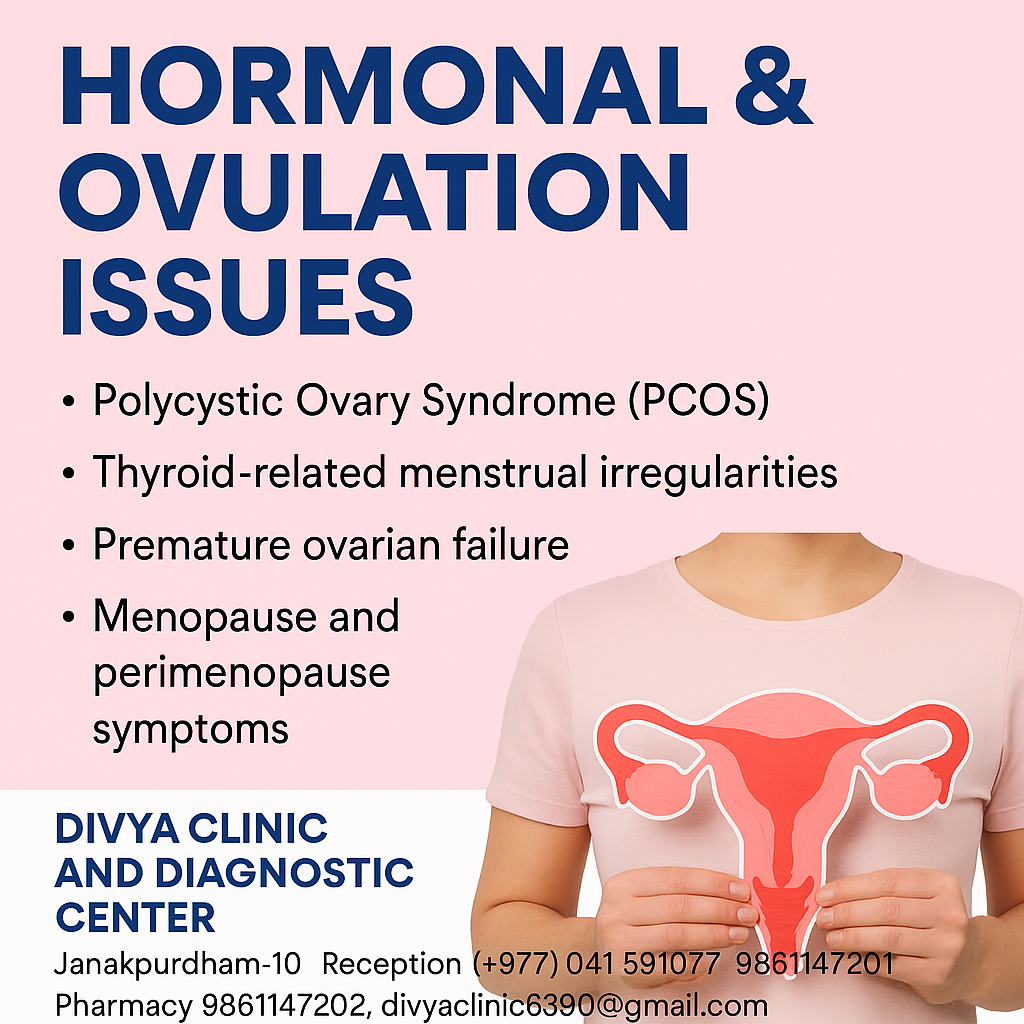Location
-
- Phone : (+977) 041 591077
- Email : [email protected]
- Location : Janakpur-10, Dhanusha

19 Sep
2025
Hormones play a key role in regulating a woman’s menstrual cycle, fertility, and overall health. When this delicate balance is disrupted, it can lead to menstrual irregularities, difficulty in conceiving, and even long-term health issues. At Divya Clinic, we help women identify and manage such hormonal problems with compassion, care, and expert diagnosis.
Here are four major hormonal and ovulation-related conditions women commonly face:
PCOS is a hormonal disorder where the ovaries produce excess male hormones (androgens), leading to cysts on the ovaries, irregular periods, and issues with ovulation.
Irregular or absent periods
Weight gain, acne, excess facial hair
Difficulty conceiving
Dark patches on the skin (insulin resistance)
Hormonal pills to regulate periods
Lifestyle changes: weight management, balanced diet
Ovulation-inducing medications for fertility
Blood sugar and insulin monitoring
Early treatment of PCOS can prevent diabetes, infertility, and heart disease later in life.
The thyroid gland controls metabolism and affects reproductive hormones. Both hypothyroidism (underactive) and hyperthyroidism (overactive) can disrupt periods and ovulation.
Hypothyroidism: fatigue, weight gain, heavy or irregular periods
Hyperthyroidism: anxiety, weight loss, short/light periods
Infertility and mood changes
Simple blood test (TSH, T3, T4) to diagnose
Thyroid hormone medications to restore balance
Ongoing monitoring to maintain reproductive health
Never ignore sudden changes in weight or cycle length — your thyroid may be the cause.
Also known as primary ovarian insufficiency, this condition occurs when the ovaries stop functioning properly before the age of 40.
Irregular or skipped periods
Hot flashes, mood swings
Trouble conceiving
Low estrogen levels
Hormone Replacement Therapy (HRT)
Calcium and vitamin D supplements
Fertility counseling and egg donation options for pregnancy
Early diagnosis is crucial — if you're under 40 and experiencing menopause-like symptoms, see a gynaecologist.
Menopause marks the end of menstruation (typically between 45–55 years), while perimenopause is the transitional phase before it.
Irregular periods
Hot flashes and night sweats
Vaginal dryness
Mood changes, memory lapses
Sleep disturbances
Hormonal and non-hormonal therapies
Bone density monitoring
Vaginal moisturizers and lubricants
Emotional support and counseling
You don’t have to suffer in silence — effective treatments are available to manage menopausal symptoms and improve quality of life.
If you are experiencing:
Irregular or absent periods
Trouble getting pregnant
Signs of early menopause
Sudden weight changes or emotional shifts
Consult a gynaecologist early. Timely evaluation can prevent complications and restore hormonal balance.
At Divya Clinic, we offer:
✅ Expert gynaecology consultations
✅ Hormonal & thyroid testing
✅ Ovulation tracking and fertility support
✅ Personalized treatment plans for PCOS, thyroid, menopause & more
📍 Address: Janakpurdham-10
📞 Reception: (+977) 041 591077, 9861147201
💊 Pharmacy: 9861147202
📧 Email: [email protected]
